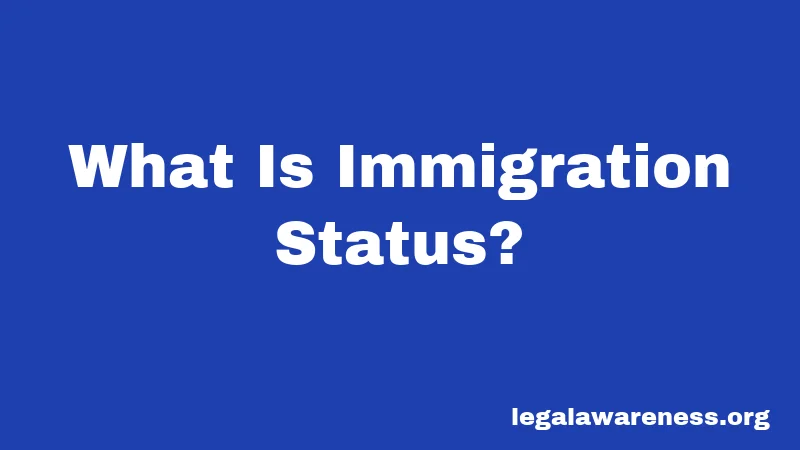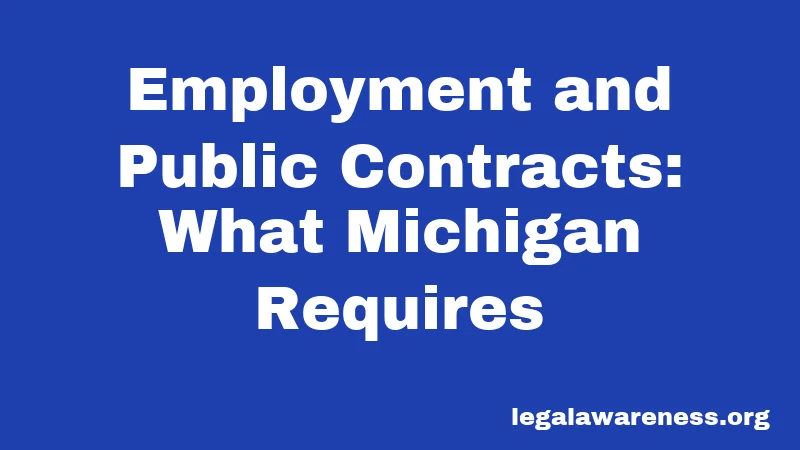Immigration Laws in Michigan (2026): What You Actually Need to Know
Most people living in Michigan have no idea how strict immigration laws actually are. Seriously. The penalties can hit hard, and the rules keep changing. Here’s what you really need to understand about the laws that affect millions of people in our state.
If you’re an immigrant living in Michigan, a family member, or someone who wants to know how these laws work, this guide breaks everything down into simple, practical information you can actually use.
What Is Immigration Status?

Think of immigration status like your permission slip to be in the United States legally. Right? So here’s the deal. Not everyone in America has the same status.
Some people are U.S. citizens. They have the most rights and protections. Then there are lawful permanent residents (also called Green Card holders). These folks have permission to live and work here permanently. Next, there are temporary visa holders—people like students or workers on specific visas. Finally, there are people with no legal status. They’re not authorized to be in the U.S.
Your immigration status determines what you can and can’t do. It affects your job, your driver’s license, your ability to travel, and way more.
Michigan’s Driver’s License Rules: Here’s Where It Gets Tricky
Okay, pause. This part is important because it affects so many people.
Since 2008, Michigan has required anyone applying for a driver’s license to prove they’re legally present in the United States. This was a big change, honestly. Before that, you didn’t need to prove your immigration status at all.
Here’s what you need to know right now: You cannot get a Michigan driver’s license if you don’t have legal immigration status. Period. Many people don’t realize how strict this is.
Who CAN Get a Michigan Driver’s License?
Lawful permanent residents can get one. That’s Green Card holders. Visa holders with valid visas can also qualify. People with employment authorization documents (work permits) are eligible too. Oh, and asylum seekers who have valid work permits? They can get a standard driver’s license now.
Not sure if your status qualifies? The short answer is: if you’re legally present, you probably can. If you’re not legally present, you definitely can’t.
What About REAL ID Licenses?
Here’s a quick distinction because it matters. Michigan issues two types of licenses: standard licenses and REAL ID licenses.
Standard licenses don’t require proof of legal presence. These don’t meet federal requirements though. REAL ID licenses have a little gold star in the upper right corner. Starting May 7, 2025, you need a REAL ID license to board domestic flights or enter federal buildings.
To get a REAL ID license in Michigan, you must prove lawful status. This is a federal requirement, not just Michigan’s rule.
Can You Drive With a Foreign License?
Wait, it gets better. You might be able to drive in Michigan with a foreign driver’s license. You don’t necessarily need a Michigan one.
If your license comes from a “treaty country” like Mexico, Guatemala, or Canada, you don’t need to prove legal immigration status. You can drive as long as your license is in English or you have a certified translation. The Michigan Immigrant Rights Center has a full list of treaty countries online.
If your license comes from a “non-treaty country,” you do need to show proof of legal presence. That could be a valid passport, visa, or immigration documents.
Pretty straightforward, right? Just make sure you understand which country your license comes from. Not all police officers know these rules, so keep that documentation with you.
Employment and Public Contracts: What Michigan Requires

Michigan law now requires employers working on public contracts to verify that employees can legally work in the U.S. This verification happens through E-Verify, a federal system.
Here’s what this means: If a company gets a government contract, they must check that their workers are authorized to work. Employers need to have all employees fill out I-9 forms. These forms document your legal work status.
If an employer doesn’t follow these rules, they can be banned from getting public contracts for a year. That’s serious money lost.
Law Enforcement and Immigration: What Are Your Rights?
Now, here’s where your rights matter. Michigan State Police has strict policies about immigration.
Police officers cannot stop you, search you, arrest you, or detain you just because of immigration status. They can’t do it. The Michigan State Police policy is crystal clear on this. They won’t ask about your immigration status unless it’s part of a criminal investigation.
But hold on—there’s a recent development. Michigan introduced bills in 2025 that would require certain law enforcement agencies to work directly with Immigration and Customs Enforcement (ICE). These bills are still being debated, but they could change things. If passed, some police departments could actually help federal agents enforce immigration laws.
If you’re detained by ICE or federal agents, you have specific rights. You can remain silent. You don’t have to sign anything. You should ask to speak with a lawyer immediately. Honestly, this is the part where having a lawyer matters most.
What Happens If You’re Arrested?

This one’s important. If local law enforcement arrests you—for any crime or even a traffic violation—they might check your immigration status.
Here’s the reality: If you’re convicted of a crime in Michigan, the law requires police to transfer you to ICE after you finish your jail time or pay your fines. Even if your crime is minor. Even if you’ve lived here your whole life. You could be deported.
Some crimes make deportation more likely than others. Violent crimes, drug crimes, and crimes involving fraud all increase your deportation risk. But honestly, even minor offenses can lead to immigration consequences. This is why getting legal help immediately matters.
Penalties and Consequences: What Could Actually Happen
So what happens if you violate immigration laws? The consequences can be serious. Really serious.
Deportation is the biggest consequence. If you’re not legally present and convicted of a crime, federal agents can remove you from the country. You could be separated from your family. You might not be able to return to the U.S. for years, or ever.
Fines are another penalty. If you’re caught working without authorization, you could face civil fines. If you make false statements on immigration forms, you could be fined up to $1,000 per violation. For perjury on I-9 forms, penalties are even harsher.
Detention happens too. If ICE detains you, you could spend weeks or months in a detention center waiting for your immigration court hearing. Michigan has ICE detention contracts with four county jails: Calhoun, Chippewa, Monroe, and St. Clair.
Employment consequences hit hard. If your employer finds out you’re not authorized to work, you’ll lose your job. You might face a lifetime ban from certain employment. Your employer could face serious penalties too.
License suspension is automatic. If you’re convicted of certain crimes, your driver’s license gets suspended. Even driving with a suspended license creates more legal problems.
Special Circumstances: Asylum Seekers and DACA Holders
Wondering if special immigration categories have different rules? Yeah, they kind of do.
Asylum seekers with valid work permits can get a standard Michigan driver’s license. They can’t get REAL ID licenses without proving lawful permanent status. But they can work and drive. If their asylum case is denied, they lose these permissions.
DACA holders (Deferred Action for Childhood Arrivals beneficiaries) can get Michigan driver’s licenses if they have current DACA status. Their DACA must be active. When DACA expires, they lose the right to drive in Michigan unless they renew it.
Temporary Protected Status (TPS) beneficiaries have work permits and can apply for driver’s licenses. But this status is temporary. When the government ends TPS for a country, people lose their work authorization.
International students on valid visas can get driver’s licenses. Their status must be current though. If they drop out of school or violate their visa terms, they become unlawfully present immediately.
This situation’s probably the trickiest because status can change quickly. One missed deadline could change everything.
Recent Law Changes: What’s Happening in 2025-2026
Hold on, it gets more complicated. Michigan’s legislature is actively changing immigration enforcement.
In 2025, new bills were introduced that would require certain police departments to enforce federal immigration laws. The “Immigration and Customs Enforcement Support Act” would let local law enforcement officers work directly with ICE. If these laws pass, Michigan police could start arresting people for immigration violations. That’s a major shift from current policy.
Another bill would require E-Verify for public contracts. This basically expands immigration checks to more employers. We mentioned this earlier, but it’s becoming stricter.
There are also ongoing discussions about driver’s licenses. Some legislators want to let undocumented immigrants get standard driver’s licenses (like ten other states already allow). But other legislators oppose this. It’s basically stuck in political debate right now. Don’t count on this changing soon.
The takeaway? Immigration enforcement is getting tighter in Michigan. The state is moving toward stricter rules, not looser ones.
What You Should Do Now: Practical Steps
Here’s the practical stuff. If you’re concerned about immigration issues, here’s what experts recommend.
First, get a lawyer. Seriously. Immigration law is complicated. You need someone who knows Michigan laws specifically. The Michigan Immigrant Rights Center offers free or low-cost legal help. Immigration Law & Justice Michigan has offices in Grand Rapids, Kalamazoo, Detroit, and Traverse City. Contact them before problems happen, not after.
Second, prepare your family. Have important documents ready. Keep copies of all immigration paperwork. Write down the phone number of an immigration lawyer. If ICE detains someone, you’ll need a lawyer fast. The Michigan Immigrant Rights Center has family preparation guides in multiple languages online.
Third, understand your rights. You have the right to remain silent. You have the right to speak to a lawyer. You don’t have to sign anything without understanding it first. Don’t answer questions about immigration status unless required by law.
Fourth, get your documents straight. If you’re eligible for a driver’s license, get one. The federal SAVE system can be slow (about 40 days), but it’s worth getting through. If you work, make sure your I-9 is correct.
Fifth, stay informed. Immigration laws keep changing. Follow the Michigan Immigrant Rights Center online. They post updates about new laws and legislative hearings.
Frequently Asked Questions
Can ICE officers stop me on the street and ask about my immigration status?
ICE can stop you, but only in limited situations. They need a valid search warrant signed by a federal judge to enter your home. If they stop you outside, you can ask if you’re free to go. You can remain silent. You don’t have to answer questions. Get a lawyer as soon as possible.
What if I was told I’m going to be deported? Can I stay?
Maybe. It depends on your situation. Some people can apply for cancellation of removal. Some qualify for waivers. Some have other relief options. You absolutely need a lawyer immediately. Don’t wait. The Michigan Immigrant Rights Center can connect you with legal help.
Can I lose my job if my employer finds out I don’t have legal status?
Yes. If your employer discovers you don’t have work authorization, they must fire you. This is federal law. However, your employer must be careful about how they handle it. They can’t discriminate based on national origin. If you think you faced discrimination, a lawyer can help.
What happens if I get pulled over for a traffic violation?
The officer can ask for your driver’s license, insurance, and registration. They generally can’t ask about immigration status unless it’s part of a criminal investigation. If you get a ticket, follow the instructions. If you miss a court date, the judge could issue an arrest warrant. Go to court.
Can I get a Michigan driver’s license with a work permit?
If your work permit is current, yes. Work permits (Form I-766) count as legal presence in Michigan. You still need to prove Michigan residency and pass all other requirements. But the SAVE verification system might take 40 days to process.
Final Thoughts
Okay, here’s the bottom line. Immigration laws in Michigan are strict and getting stricter. The rules affect where you can work, how you can drive, and even whether you can stay in the country.
You’re not alone if this feels overwhelming. These laws confuse a lot of people. The important thing is getting accurate information and legal help when you need it.
Know your rights. Understand your status. Get a lawyer before problems happen, not after. And remember: you have options, even when things feel hopeless.
If you’re in Michigan and facing immigration issues, reach out to the Michigan Immigrant Rights Center. They’re experts. They know Michigan law inside and out. Getting help early can change everything.
Now you know the basics. Stay informed, stay safe, and when in doubt, ask a lawyer.
References
- Michigan Legislature – Immigration and Customs Enforcement Support Act (Senate Bill 43): https://legislature.mi.gov/documents/2025-2026/billintroduced/Senate/htm/2025-SIB-0043.htm
- Michigan State Police – Immigration Policy: https://www.michigan.gov/msp/public-information/transparency/accordion/policies/immigration
- Michigan Compiled Laws – MCL 791.234b (Deportation and Parole): https://www.legislature.mi.gov/Laws/MCL?objectName=mcl-791-234b
- Michigan Secretary of State – Driver’s License and ID Requirements: https://www.michigan.gov/sos/all-services/first-time-license-or-id
- Michigan Immigrant Rights Center – Legislative Updates: https://michiganimmigrant.org/
- Michigan Legal Help – Immigration Basics: https://michiganlegalhelp.org/resources/immigration
- Farmworker Legal Services – Driving in Michigan: https://farmworkerlaw.org/farmworker-rights/driving
- Immigration Law & Justice Michigan – Legal Services: https://www.iljmi.org/
- Michigan Legal Help – Driving as a Non-Citizen: https://michiganlegalhelp.org/resources/farmworkers/driving-michigan-non-citizen
- Asylum Seeker Advocacy Project – Michigan Driver’s License Information: https://asaptogether.org/en/licenses/michigan/
